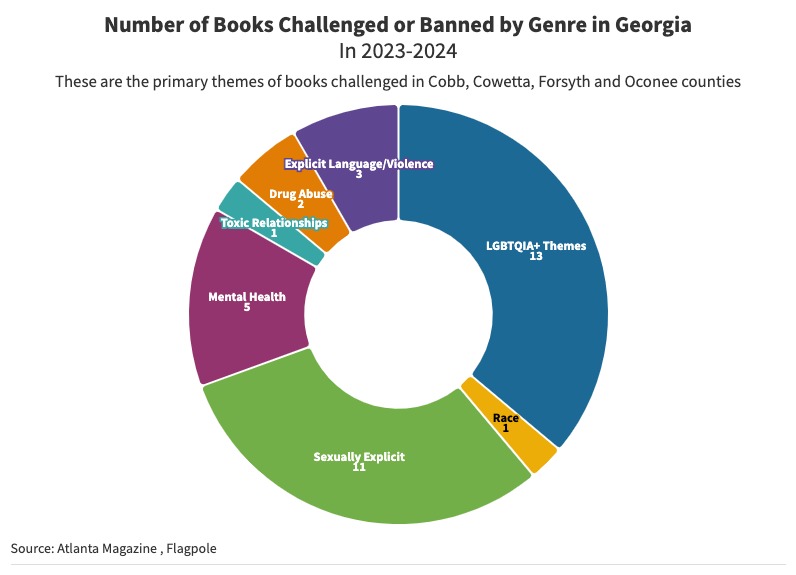A trip to the library, for many children, can mean an introduction to a new place, time or group of people. It can also be a place where children see themselves in the books that they pick up off the shelves.
However, in some counties in Georgia, books connected to identity including race, sexuality, and religion are being reclassified and in some cases — banned. Oconee County and Athens-Clarke County are now dealing with this issue with librarians joining in on the conversation.
“All of it is absolutely absurd. It’s anti-American. It’s anti-democratic to limit access and knowledge,” University of Georgia Language and Literacy Education Assistant Professor, Jamie Hogan said. “These are things we see that in places like Russia and North Korea and other nations that we should not want to emulate.”
Banning Books Across the Nation
Across the country, more than 1,500 book titles have been challenged during the 2022-2023 academic year by parents and activists for themes of race, sexuality, religion and gender identity, according to non-profit organization PEN America.
In Georgia, there have been several counties, including Cobb, Coweta and Forsyth, that have permanently banned multiple books in October 2023. Many of these books feature LGBTQ themes.
In Oconee County, the Oconee County Library Board recently denied a request to reclassify four books featuring LGBTQ themes from “young adult” or “juvenile” into the adult section in January 2024. These four books included “Tomboy” by Liz Prince, “Different Kinds of Fruit” by Kyle Lukoff, “Man o’War” by Cory McCarthy and “Laura Dean Keeps Breaking Up With Me” by Mariko Tamaki and Rosemary Valero-O’Connell.
These same four books have also been requested for reclassification regionally among others including “If You’re a Kid Like Gavin” by Gavin Grimm, “The ABC’s of LGBT+” by Ashely Mardell and “Flamer” by Mark Curato, according to Athens-Clarke County Library Public Information Officer Darcy Calia.
A Brief Look at Oconee’s Challenged Books

Mirrors and Windows
Some members of the community disagree with book challenges and feel that it is important for children to have access to diverse and inclusive literature. Hogan is one of those people; she has worked on committees in the Athens area as a literacy professional to help combat book challenges.
Kids need to see books that look like them. We call them mirrors and windows in the language and literacy education field.”
“They need to experience books that they can connect to and relate to, but then they also need to read texts that share other identities and stories and histories and places that they’re not familiar with,” Hogan said.
With many book challenges, parents and activists have deemed many of the challenged books involving LGBTQIA+ themes as “inappropriate,” “sexually explicit” and “pornographic.” However, this is often not said about books featuring heterosexual or cisgender romances and experiences.
“We inherently read and know about the heterosexual experience and the cisgender experience, but we don’t think that’s pornographic or harmful, right?” Hogan said. “So, it cuts both ways.”
Hogan believes these books are important in showing kids in marginalized groups that their identity has meaning and teaching other children about communities different from their own.
“I think you’re looking at telling a significant number of children that their identity is shameful and should not exist,” Hogan said. “Then to the others, they’re not being equipped with the tools to be good allies to know what those experiences entail.”
In April 2022, Gov. Brian Kemp signed Senate Bill 226 into law which changed the process of how Georgia schools may ban books. The law limits who can formally challenge a book to only parents and guardians of students enrolled in the school where the challenge is taking place and puts the final decision into the hands of the school administrator. This means that the school administrator will decide whether or not the book will be taken from library shelves.
With only parents of students in the school able to challenge books, it can feel like parents are trying to hold power over more than just their own child.
“As a parent, I’m not here to tell anyone how to raise their child,” Hogan said. “I have a 5 year old. We’re gonna raise him to be the best human he can be, but you don’t have the right to take away opportunities and reading experiences for other children.”
Genres of Books Banned in Georgia Over the Last Year

The Gatekeepers of the Library
However, Senate Bill 226 does not apply to public libraries as seen by the book challenges brought up in Oconee County. The challenges there were introduced by Moms for Liberty, an organization originally founded in 2021 to oppose COVID-19 measures.
Currently, the Athens Regional Library System can only take on five book challenges per quarter due to staff constraints and because the formal challenge request process goes through multiple stages before reaching the library board.
After the request has been submitted, it will be reviewed by a Masters of Library and Information Sciences certified librarian who then reads the book, takes note of any concern and gives their recommendation of what to do with the book. The book challenge is then reviewed by a committee of librarians, and ultimately, the library board makes the final decision.
“At our core, we believe in making literature accessible to the community. Our communities are very diverse in a lot of different ways,” Athens-Clarke County Library Public Information Officer Darcy Calia said. “It’s hard to curate a collection to meet the needs of everybody in the community. We recognize that, but we do believe that everybody should be able to walk into a library and see themselves on our shelves. We do exist to serve our community.”
With these committees comes a lot of responsibility to protect what should be in libraries, and it’s not just the students that Hogan feels need to be protected from book bans.
“So these committees help keep those books accessible to our kids and to our teachers,” Hogan said. “I’d like to think that not only are we supporting students, we’re supporting their educators too, because they’re making choices around what books to pull into their curriculum and to share with their students.”
Motivation for the Road Ahead
Two new bills S.B. 390, which loosens library certifications and cuts funding to programs tied to the American Library, and S.B. 394, which requires the state board of education to define what content may be defined as “harmful to minors, restricted materials, and sexually explicit,” are making their way through the Georgia State Senate. These two bills may make book challenges even more prominent along with reducing library staff.
While the LGBTQIA+ community faces having their representation limited in libraries, libraries face slashed budgets and pressure from outside groups, which makes it a worrying time for both communities. However, Hogan does have one hope for the future of libraries.
“I hope that [S.B. 390 and S.B. 394 being voted into law] further motivates us to do what’s best for students and teachers and the community at large,” Hogan said. “And I hope our electorate recognizes the policy makers who are pushing these initiatives.”
Caleb Struchtemeyer is a fourth-year journalism student at the University of Georgia.







Show Comments (0)